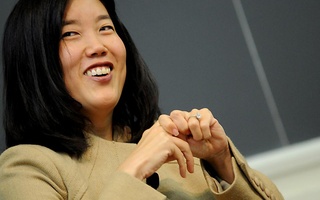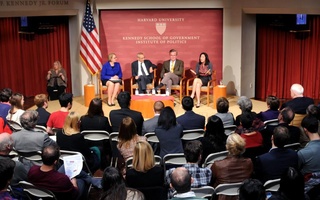Twenty-six newly elected Congresspeople gathered at the Institute of Politics last week to attend sessions on topics they will address as legislators, as well as to meet other new members and interact with undergraduates.
During the 19th Bipartisan Program for Newly Elected Members of Congress, the freshman Congresspeople attended panels on important policy issues, such as foreign policy, the economy, and education. In addition, they attended panels on more practical issues, such as how to deal with the White House and the media.
Although 18 of the 26 members who attended are Republican, the conference prides itself on hosting a mix of Republican and Democrat panelists. “The real importance of this is to get Republicans and Democrats to talk with each other and find out how they think and how to find common ground,” said Christian B. Flynn, the IOP associate director for conferences and special projects.
“The purpose [of the panels] is to inform [the Congresspeople] as much as we possibly can and to provide as much expertise as possible,” said Benjamin S. Raderstorf ’14, a member of the IOP Special Events Committee who helped plan the conference.
On Friday, former U.S. Secretary of Education Margaret Spellings, New York University Professor of Education Pedro Noguera, and former Chancellor of District of Columbia Public Schools Michelle Rhee participated in a panel about education policy.
Dean of the Graduate School of Education Kathleen McCartney, who moderated the session, asked the panelists to discuss their recommendations for the elementary and secondary education acts, which includes the possible renewal of No Child Left Behind.
That is the main education topic the new members will be addressing in Congress.
Spellings, who was Secretary of Education when NCLB began, explained what NCLB is.
Rhee discussed the importance of teacher achievement and laying off ineffective teachers.
“Don’t think of overhauling the entire thing,” Rhee suggested, “But, rather, improving what is not working.”
Noguera discussed the lack of instruction in NCLB about how to improve schools and the importance of finding scalable school models that can be spread around the country.
The diversity of the panel allowed the members to get a comprehensive, bipartisan view of education.
Lou J. Barletta, a new Congressman from Pennsylvania, said that the conference caused him to realize that he would like to be on the energy and education committees, instead of what he had previously selected.
The conference attendees agreed with Barletta, who said, “It was a great opportunity to hear about policy and become more educated on the issues we’ll be confronting.”
—Staff writer Monika L.S. Robbins can be reached at mrobbins@college.harvard.edu.
Read more in News
Attorney General Investigates ClubRecommended Articles
-
Viva La Rhee-voluciónRhee’s efforts have been a significant step in bringing education to the forefront of the American political consciousness, but her potential departure cannot dissuade others from joining the broad revolution she represents.
-
 Michelle Rhee Presses for Ed Reform
Michelle Rhee Presses for Ed Reform -
 Ed Panel Emphasizes Reform
Ed Panel Emphasizes Reform -
 Ed Panel Emphasizes Reform
Ed Panel Emphasizes Reform -
No Child Left Behind, Or ElseGiven the political difficulty of mandating higher standards for schools and teachers, student accountability might be the most realistic—and perhaps the most effective—way of improving educational outcomes.
-
Iodide Exposure Tied To Thyroid DisordersResearchers from Harvard Medical School and Brigham and Women’s Hospital found that exposure to high levels of iodide—widely given intravenously to patients for medical imaging procedures—is associated with an increased risk of thyroid disease.













